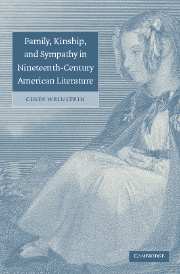Book contents
- Frontmatter
- Contents
- Acknowledgments
- Introduction
- 1 In loco parentis
- 2 “A sort of adopted daughter”: family relations in The Lamplighter
- 3 Thinking through sympathy: Kemble, Hentz, and Stowe
- 4 Behind the scenes of sentimental novels: Ida May and Twelve Years a Slave
- 5 Love American style: The Wide, Wide World
- 6 We are family, or Melville's Pierre
- Afterword
- Notes
- Select bibliography
- Index
- Cambridge Cultural Social Studies
5 - Love American style: The Wide, Wide World
Published online by Cambridge University Press: 22 September 2009
- Frontmatter
- Contents
- Acknowledgments
- Introduction
- 1 In loco parentis
- 2 “A sort of adopted daughter”: family relations in The Lamplighter
- 3 Thinking through sympathy: Kemble, Hentz, and Stowe
- 4 Behind the scenes of sentimental novels: Ida May and Twelve Years a Slave
- 5 Love American style: The Wide, Wide World
- 6 We are family, or Melville's Pierre
- Afterword
- Notes
- Select bibliography
- Index
- Cambridge Cultural Social Studies
Summary
Most sentimental novels end in marriage, which is to say that they, by and large, conclude with an affirmation of the heroine's ability to make a contract. Although one might reasonably argue that she has no other choice than to marry, the fact is that the marital contract stands as the apotheosis of her sentimental journey, the culmination of her ability to establish loving bonds based on choice. Through this contract, she asserts her belief in the traditional reproduction of the biological family which will, she hopes, avoid the pain and disaster of the consanguineous family from which she comes.
My reading of the relation between sentimental fictions and slave narratives continues and concludes by considering Susan Warner's best-selling The Wide, Wide World. The chapter explores how Warner's novel, in contrast to the sentimental fictions examined thus far, presents a different and considerably less sanguine view of contract than we've seen up to this point; one which registers, to a degree surpassed, perhaps, only by slave narratives and Melville's Pierre, the disciplinary, psychic, and institutional restraints upon the heroine's ability to make choices, whether the context be adoption or marriage. Unlike Gerty, Ellen doesn't come to the contractual table in possession of herself, because that self always belongs to someone else, whether that someone is her mother, John Humphreys, God, or the multitude of characters who are constantly claiming ownership of her.
- Type
- Chapter
- Information
- Publisher: Cambridge University PressPrint publication year: 2004

